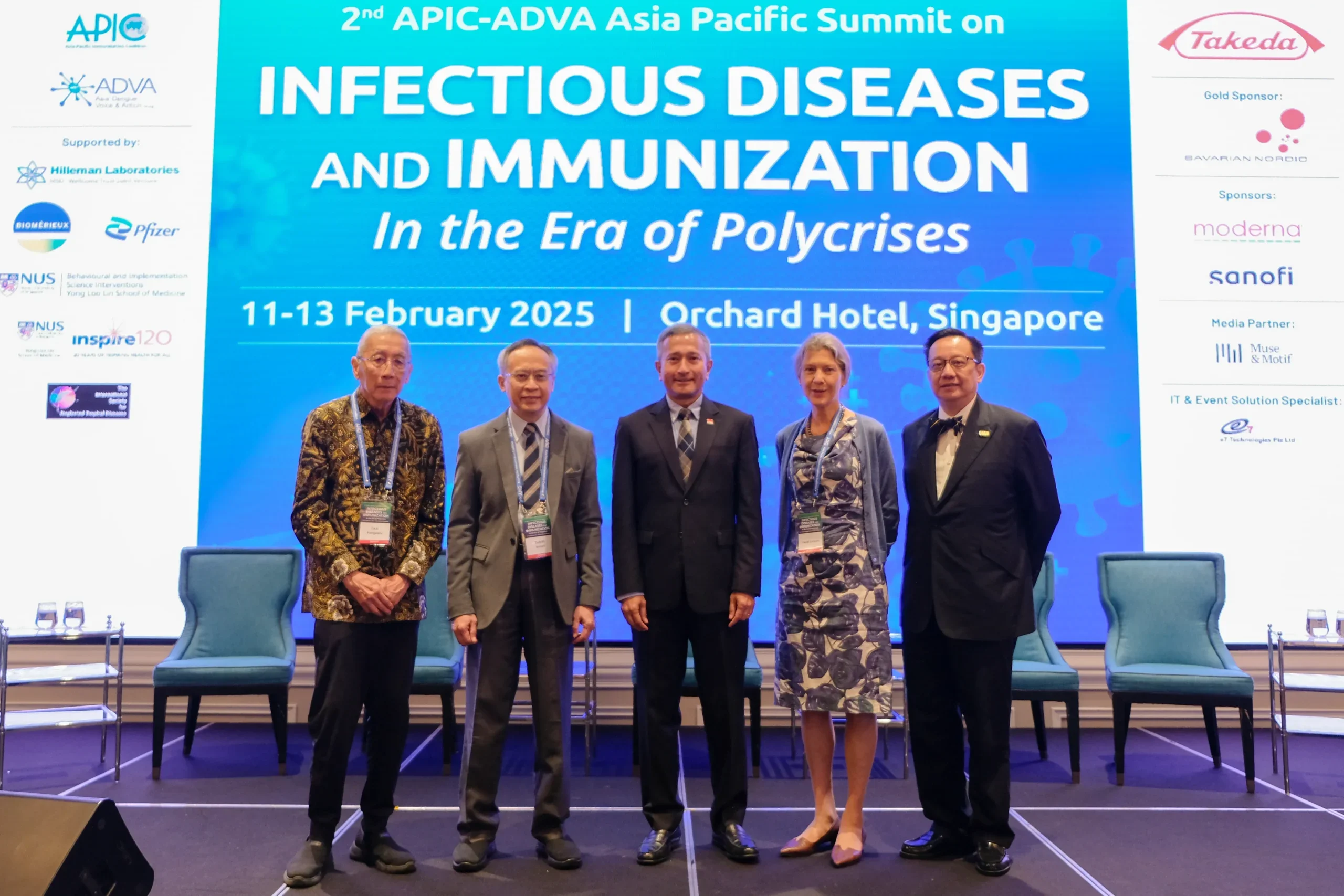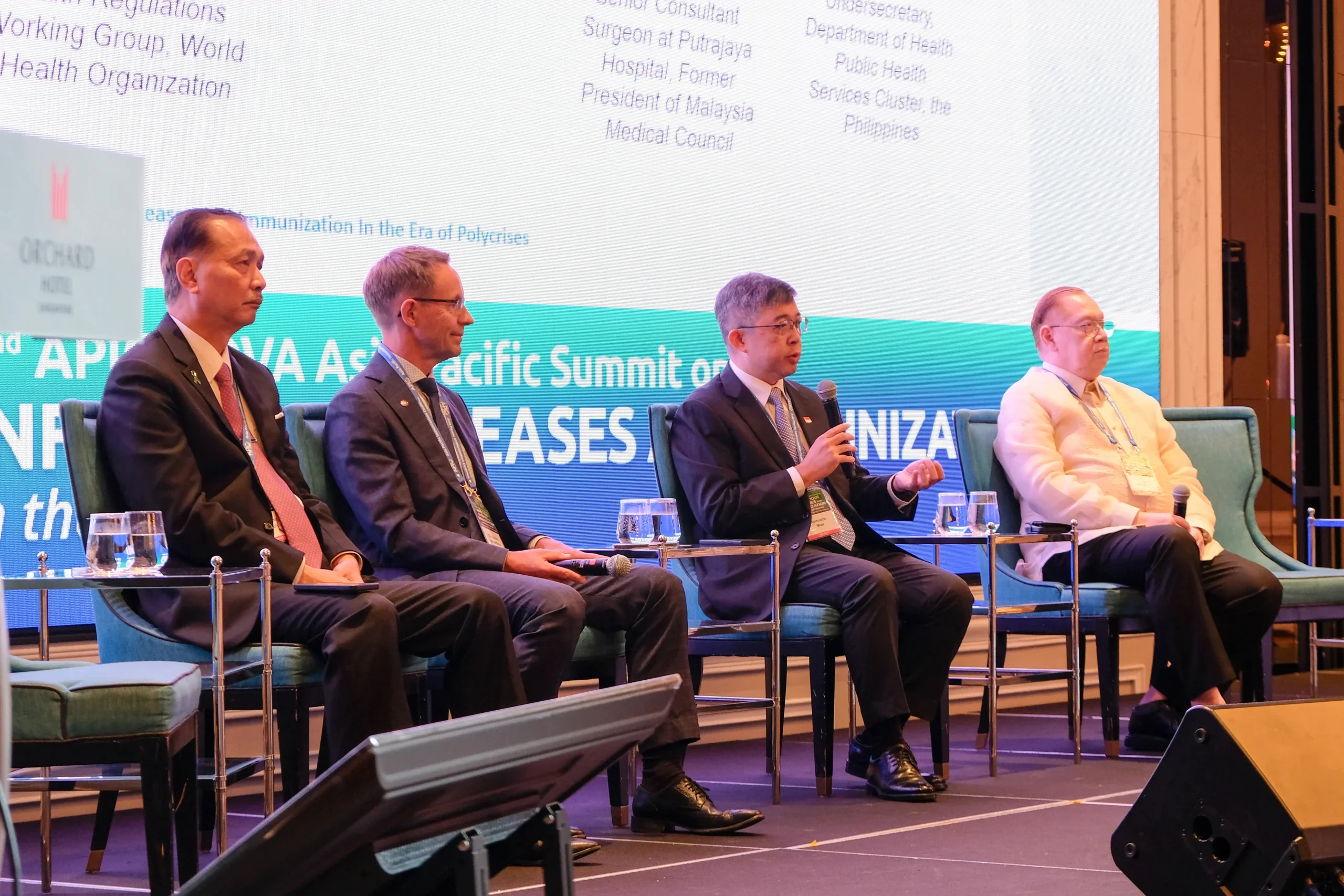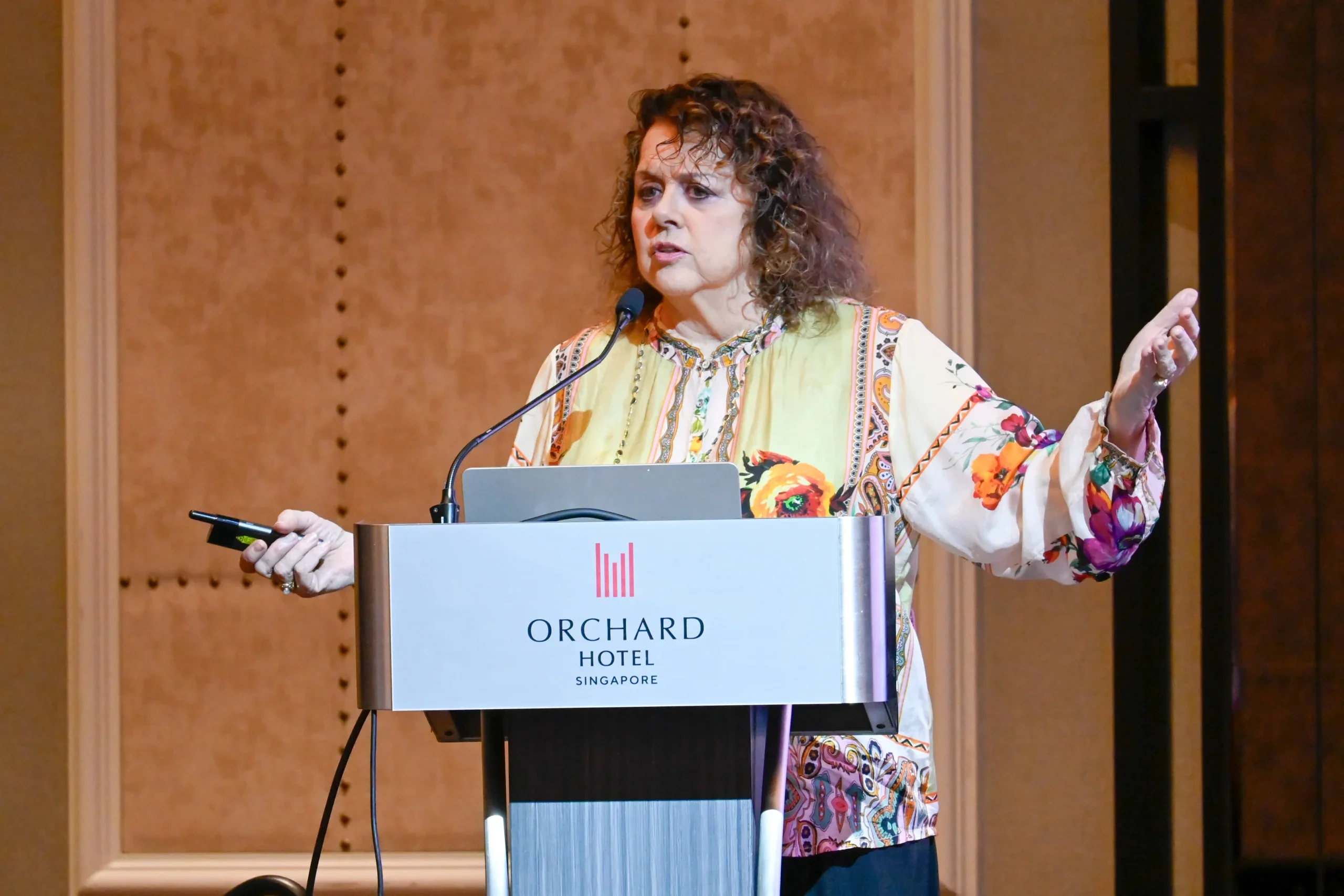2nd APIC-ADVA Summit: To Drive Discussions on Infectious Diseases and Immunization In the Era of Polycrises
Published: 18 Feb 2025

After the welcome and opening speeches. Professor Tikki Pangestu, Visiting Professor, NUS Medicine; Professor Datuk Zulkifli Ismail, Chairperson, Asia Dengue Voice and Action Group; Dr Vivian Balakrishnan, Minister for Foreign Affairs, Singapore; Professor Heidi Larson, Co-Chair, Asia Pacific Immunization Coalition; Professor Chong Yap Seng, Dean, NUS Medicine.
The Asia Pacific Immunization Coalition (APIC) and the Asia Dengue Voice & Action (ADVA), in collaboration with the Centre for Behavioural and Implementation Science Interventions (BISI) at the Yong Loo Lin School of Medicine, National University of Singapore (NUS Medicine), convened the 2nd APIC-ADVA Summit from 11 February to 13 February 2025. The Summit was graced by Guest-of-Honour, Dr Vivian Balakrishnan, Minister for Foreign Affairs, Singapore, who gave an opening address which emphasised the importance of regional cooperation and innovation in driving progress within the global health community.
This Summit was part of a week-long series of activities in Singapore dedicated to addressing infectious diseases preparedness and developing strategies within the global health community to tackle widespread health emergencies. The week commenced with the official launch of the Centre for Infectious Disease Emergency Response (CIDER) at the Yong Loo Lin School of Medicine, National University of Singapore, on 10 February 2025. CIDER was an innovative initiative aimed at enhancing pandemic preparedness and strengthening responses to infectious disease emergencies. Following its launch, the APIC-ADVA Summit brought together global and regional public health experts who engaged in robust discussions to advance public health, underscoring Singapore’s role in regional cooperation for public health.
“Since the inaugural APIC-ADVA Summit in 2023, the world had faced an escalating array of challenges, compounded by vaccine misinformation and security concerns. This year’s summit came at a crucial moment, providing a platform to collaborate, share insights, and develop strategies that would advance the global health community toward greater preparedness and resilience,” said Professor Tikki Pangestu, Co-Chair of APIC and Visiting Professor at NUS Medicine.
Themed ‘Infectious Diseases and Immunization in the Era of Polycrises,’ the summit addressed the multifaceted challenges shaping the world – pandemics, climate change, geopolitical tensions, and misinformation. Bringing together prominent experts, including scientists, researchers, public health leaders, policymakers, and pharmaceutical industry representatives from across the global health community, the 2nd APIC-ADVA Summit served as a unique platform to discuss critical advancements in infectious disease policies and program implementation.
Key topics included the impact of megatrends such as climate change, major international health agreements and regulations, regional pandemic preparedness, resilience, vaccine security, and the vital role of implementation science in vaccine delivery.

Members of the “Roundtable perspectives from Director Generals of Health” discussion, Tan Sri Dr Noor Hisham, Sir Ashley Bloomfield, Professor Kenneth Mak, and Dr Enrique A. Tayag.
Panel Discussions and Speakers Spotlight
The 2nd APIC-ADVA Summit featured 16 keynote speeches and seven panel discussions, including:
- An opening address by Dr Vivian Balakrishnan, Minister for Foreign Affairs, Singapore, emphasising the importance of regional cooperation and innovation in driving progress within the global health community and setting the tone for the 2nd APIC-ADVA Summit.
- “Roundtable perspectives from Director Generals of Health,” featuring senior health leaders Professor Kenneth Mak, Sir Ashley Bloomfield, Tan Sri Dr Noor Hisham Abdullah, and Dr Enrique A. Tayag, representing Singapore, New Zealand, Malaysia, and the Philippines, respectively. Moderated by Dr Louisa Sun, the panel emphasised the critical need for strengthening national and regional collaborations in the face of crises.
- “Advancing Pandemic Preparedness: Policy and Innovation Lessons for the Future”, with insights from Sir Ashley Bloomfield, Ms Laurie Garrett, Professor David Heymann, and Dr Ahmed Razavi, moderated by Professor Vernon Lee.
Other prominent panels included:
- “Mpox Emergency: Global Epidemiology and the Role of Vaccination with MVA-BN as a Critical Countermeasure”
- “Closing Gaps: Progress on Vaccine Security and Cooperation in the Region”
- “Mega Trends and Scientific Advances”

Ms Laurie Garrett, Science Journalist, during her keynote speech, “Global Health is Dead. Long Live Global Health”.
Keynote speakers included:
- Sir Ashley Bloomfield, Former Director-General of Health New Zealand and past Co-chair of the International Health Regulations Working Group, World Health Organization, who delivered a keynote speech on “Global Health Leadership in a Post-Pandemic World”.
- Ms Laurie Garrett, Science Journalist, Pulitzer Prize and Peabody-winning author of The Coming Plague and Betrayal of Trust: The Collapse of Global Public Health, and a member of the Council on Foreign Relations Security Advisory Board, who discussed “Global Health is Dead. Long Live Global Health”.
- Professor David Heymann, Professor of Infectious Disease Epidemiology at the London School of Hygiene and Tropical Medicine, who spoke on “Innovations for More Equitable Access to Endemic, Epidemic, and Pandemic Vaccines”.
- Dr Ahmed Razavi, Lead for the UK Health Security Agency International Health Regulations Strengthening Project, who addressed “Regional and Innovative Approaches to Global Health Security”.
- Dr Sylvie Briand, Director of the Global Preparedness Monitoring Board and former WHO Director of the Epidemic and Pandemic Preparedness and Prevention Department, who shared reflections on Day 1 of the summit and provided a WHO perspective on strengthening global epidemic and pandemic preparedness.
The summit also featured numerous representatives and/or exhibition booths from Gavi, The Vaccine Alliance, the Clinton Health Access Initiative (CHAI), the World Bank, the International Vaccine Institute (IVI), industry partners, and universities.



